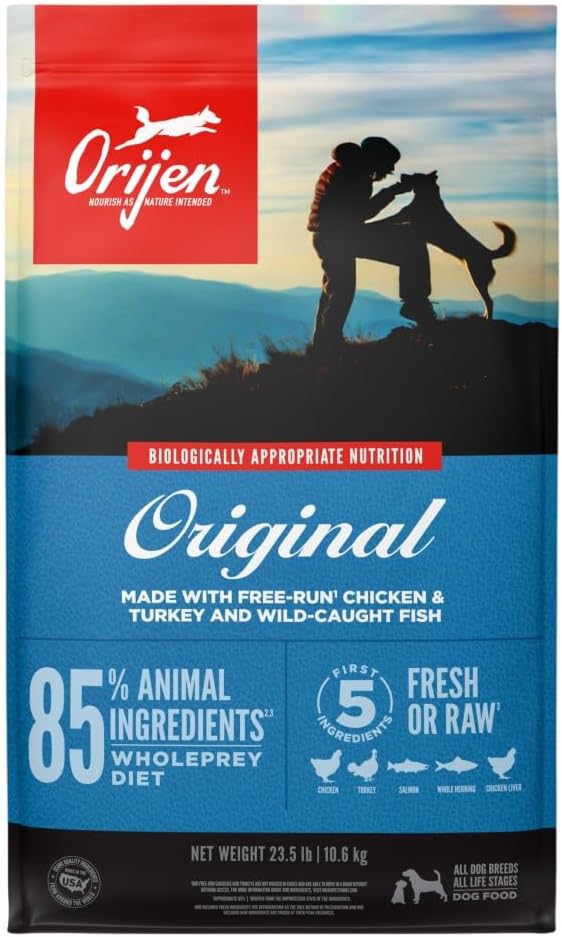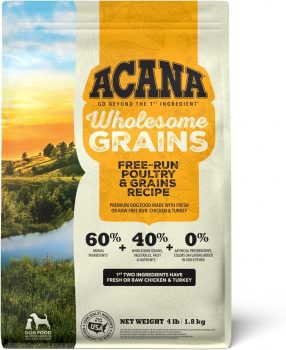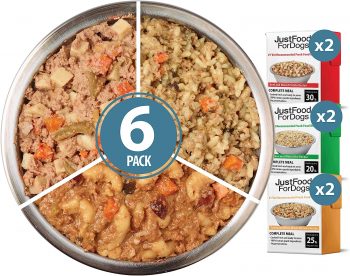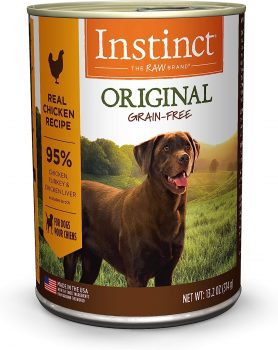English Springer Spaniels, known for their boundless energy and affectionate nature, require a well-balanced diet to maintain health and vitality. This comprehensive guide is designed to give Springer Spaniel owners the knowledge to feed their dogs optimally.
Understanding the Nutritional Needs of English Springer Spaniels
English Springer Spaniels are active and energetic dogs, requiring a diet that supports their lifestyle. Their diet should balance proteins, fats, carbohydrates, and essential vitamins and minerals. Proteins are crucial for muscle maintenance, fats provide energy and support coat health, and carbohydrates offer a source of sustained energy.
Our 5 Top Foods for English Spriner Spaniels
The diets were selected by our founder Justin Palmer, a certified canine nutrition expert, specifically with Springer Spaniels in mind:
| Food | Pros | Cons |
|---|---|---|
|
|
|
|

Check Today's Price on: |
|
|

Check Today's Price on: |
|
|

Check Today's Price on: |
|
|

Check Today's Price on: |
|
|
High-Quality Protein Sources for Muscle Health
Protein is a critical component of a Springer Spaniel’s diet. Look for dog food that lists accurate meat sources like chicken, beef, lamb, or fish as the first ingredient. These proteins help in muscle development and maintenance, which is particularly important for this active breed.
The Role of Healthy Fats and Carbohydrates
Healthy fats are necessary for energy and maintaining a healthy coat. Sources of good fats include fish oil and flaxseed oil. Carbohydrates should come from whole grains and vegetables, providing the necessary energy, aiding digestion, and promoting intestinal health.
Essential Vitamins and Minerals for Overall Wellbeing
A well-rounded diet for a Springer Spaniel should include essential vitamins and minerals. Calcium and phosphorus are important for bone health, while vitamins such as A, E, and C support the immune system, skin, and eye health. Commercial dog foods for medium-sized breeds typically contain these nutrients in balanced proportions.
Appropriate Portion Sizes and Feeding Frequency
Portion control is essential to prevent obesity in English Springer Spaniels. Generally, an adult Springer Spaniel needs about 1.5 to 2 cups of dry dog food daily, divided into two meals. The exact amount can vary based on the dog’s age, activity level, and metabolism, so it’s advisable to consult with a veterinarian.
Tailoring Diet for Puppies and Senior English Springer Spaniels
Puppy and senior Springer Spaniels have different dietary requirements. Puppies need more calories and nutrients to support their growth, while old dogs may require a diet lower in calories and higher in fiber. Adjust the diet based on the dog’s life stage and activity level for optimal health.
Importance of Hydration in a Springer Spaniel’s Diet
Hydration is as important as solid food for English Springer Spaniels. Always provide access to fresh, clean water. Wet food can also contribute to hydration, which is beneficial for dogs that may not drink enough water.
Managing Food Allergies and Sensitivities
Springer Spaniels, like many breeds, can develop food allergies or sensitivities. Common signs include itching, digestive issues, and ear infections. An elimination diet can help identify specific allergens. Hypoallergenic diets or limited ingredient formulas may be beneficial.
Monitoring Weight and Adjusting the Diet
Regularly monitoring your Springer Spaniel’s weight is crucial. Adjust portions based on the dog’s activity level and weight changes. Please consult with a veterinarian to determine the ideal weight and adjust the diet to maintain it.
Treats and Snacks: Healthy Options for Springer Spaniels
Treats should be given in moderation and be healthy. Opt for low-calorie, nutritious treats and avoid human foods toxic to dogs, such as chocolate, grapes, onions, and xylitol.
In conclusion, feeding your English Springer Spaniel a balanced diet tailored to their needs is critical to their health and happiness. Regular veterinary consultations and monitoring are essential to keep their diet on track. Your Springer Spaniel will enjoy a healthy, active life with proper nutrition.
What Health Issues Are English Springer Spaniels Prone To, and How Can a Proper Diet Help?
English Springer Spaniels are a beloved breed known for their friendly and energetic nature. However, like all breeds, they are prone to specific health issues. This comprehensive guide will explore the common health concerns of English Springer Spaniels and how a proper diet can play a vital role in their management and prevention.
Hip Dysplasia and Joint Health in English Springer Spaniels
Hip dysplasia is common in many dog breeds, including English Springer Spaniels. A diet rich in Omega-3 fatty acids, which can be found in fish oil, can help reduce inflammation and joint pain. Additionally, maintaining a healthy weight through balanced nutrition is crucial to reducing their joints’ stress.
The Importance of Diet in Managing Ear Infections
English Springer Spaniels are prone to ear infections due to their floppy ears. A diet that supports a healthy immune system can help prevent infections. This includes foods rich in antioxidants like vitamins E and C in fruits and vegetables. Regular ear cleaning and checks are also necessary.
Skin Allergies and Dietary Responses
Springer Spaniels can suffer from skin allergies, which may manifest as itchy skin or rashes. A diet with the right balance of Omega-3 and Omega-6 fatty acids can promote healthy skin and coat. Hypoallergenic diets or those with limited ingredients can also help identify and avoid allergens.
Eye Health: Nutritional Prevention of Progressive Retinal Atrophy
Progressive Retinal Atrophy (PRA) is an eye condition affecting some English Springer Spaniels. While genetics play a significant role, a diet rich in antioxidants can support overall eye health. Foods high in antioxidants include blueberries, carrots, and leafy green vegetables.
The Role of Diet in Weight Management
Maintaining a healthy weight is particularly important for English Springer Spaniels. Obesity can exacerbate many health issues, including joint problems. Feeding them a balanced diet with appropriate portions and ensuring regular exercise can help them manage their weight.
Preventing Bloat with Proper Dietary Practices
Bloat, or gastric torsion, is a severe condition that can affect Springer Spaniels. To reduce the risk, feed them smaller, more frequent meals rather than one large meal. Avoiding exercise before and after eating and ensuring a diet that is not overly high in fermentable carbohydrates can also help.
Dietary Considerations for Heart Health
While not as common, some Springer Spaniels may develop heart conditions. A diet low in sodium and rich in Omega-3 fatty acids can support heart health. Regular veterinary check-ups are also crucial for early detection and management.
Managing Allergies and Food Sensitivities
Like many breeds, Springer Spaniels can develop food allergies or sensitivities. Identifying and eliminating allergenic foods is critical. Limited-ingredient diets can help determine the cause of allergic reactions.
Nutritional Support for Active Springer Spaniels
English Springer Spaniels are active dogs and require a diet that supports their energy levels. Diets higher in calories and proteins are beneficial for active Springer Spaniels. It’s important to adjust their diet based on their activity level to ensure they’re receiving sufficient energy.
Senior Springer Spaniels: Adjusting Their Diet for Aging
As English Springer Spaniels age, their dietary needs change. Senior dogs may benefit from diets lower in calories but higher in fiber and supplements like glucosamine for joint health. Regular veterinary check-ups can help determine the specific dietary needs of aging dogs.
Conclusion: Tailoring Diet for English Springer Spaniel Health
In conclusion, while genetics play a significant role in the health of English Springer Spaniels, a proper diet can significantly aid in managing and preventing health issues. A balanced diet tailored to their needs and life stage and regular veterinary care can help ensure these energetic and affectionate dogs lead long, healthy lives.
Frequently Asked Questions About Feeding English Springer Spaniels
1. What is the best type of dog food for an English Springer Spaniel?
The best dog food for English Springer Spaniels should be high in quality proteins and balanced in fats and carbohydrates. Look for foods that list real meat (like chicken, beef, or fish) as the primary ingredient. Ensure the food is suitable for medium breeds and meets the nutritional needs of English Springer Spaniels.
2. How much should I feed my English Springer Spaniel?
The amount of food for an English Springer Spaniel varies with age, size, activity level, and metabolism. Generally, adult Springer Spaniels need about 2 to 2.5 cups of dry dog food per day, divided into two meals. However, this can vary, so it’s essential to consult your vet for specific guidance.
3. Are grain-free diets suitable for English Springer Spaniels?
Grain-free diets can be suitable for English Springer Spaniels, especially if they have sensitivities or allergies to grains. However, ensuring the diet is well-balanced and provides all the necessary nutrients is essential. Always consult your veterinarian before significantly changing your Springer Spaniel’s diet.
4. How often should I feed my English Springer Spaniel puppy?
English Springer Spaniel puppies should be fed three to four times daily with puppy-specific food. As they grow, you can gradually reduce the number of feedings to twice daily. It’s essential to provide them with a diet that supports their growth and development during their first year.
5. Can English Springer Spaniels eat a raw food diet?
English Springer Spaniels can eat a raw diet. Still, it must be carefully balanced to include the right protein, fat, carbohydrates, and essential vitamins and minerals. Raw diets should be prepared under the guidance of a veterinarian or a canine nutritionist to ensure they meet all of your Springer Spaniel’s nutritional requirements.
6. What human foods are safe for English Springer Spaniels?
English Springer Spaniels can safely eat certain human foods in moderation, such as lean meats, carrots, apples (without seeds), and green beans. However, avoid toxic foods to dogs, including chocolate, grapes, onions, and garlic. Always introduce new foods gradually and in small amounts.
7. How can I tell if my English Springer Spaniel is overweight?
To determine if your English Springer Spaniel is overweight, feel for their ribs and check their body shape. You should be able to handle the ribs without a thick layer of fat, and they should have a visible waist when viewed from above and a tummy tuck from the side.
8. What supplements should I add to my English Springer Spaniel’s diet?
Joint supplements for English Springer Spaniels include fish oil for omega-3 fatty acids, glucosamine for joint health, and probiotics for digestive health. However, always consult a veterinarian before adding supplements to your dog’s diet.
9. Is it okay for English Springer Spaniels to have dairy products?
Some English Springer Spaniels can tolerate dairy products in small amounts, but many dogs are lactose intolerant. If you give dairy, start with small amounts and monitor for any signs of digestive upset. Low-lactose dairy products like plain yogurt can be safer options.
10. How do I transition my Springer Spaniel to a new food?
When transitioning your English Springer Spaniel to a new food, do it gradually over 7-10 days. Start by mixing a small amount of the fresh food with the old, gradually increasing the fresh food and decreasing the old. This gradual change helps prevent digestive issues.
11. What are the signs of food allergies in English Springer Spaniels?
Signs of food allergies in English Springer Spaniels can include itching, red or inflamed skin, chronic ear infections, and gastrointestinal issues like diarrhea or vomiting. If you notice these symptoms, consult your veterinarian, who may suggest an elimination diet to identify the allergen.
12. Can English Springer Spaniels eat a vegetarian diet?
While dogs can technically survive on a vegetarian diet, it’s not ideal for English Springer Spaniels. They thrive on a diet that includes high-quality animal protein. If you’re considering a vegetarian diet for health or other reasons, consult a vet or canine nutritionist to ensure all nutritional needs are met.
13. Should I feed my English Springer Spaniel wet or dry food?
Both wet and dry foods have benefits for English Springer Spaniels. Dry food can benefit dental health, while wet food can be more palatable and hydrating. Some owners choose to mix both. The best choice depends on your dog’s health needs, preferences, and lifestyle.
14. How can I prevent obesity in my English Springer Spaniel?
Prevent obesity in English Springer Spaniels by maintaining a balanced diet with controlled portion sizes and ensuring regular exercise. Monitor their food intake, keep treats to a minimum, and ensure they get daily physical activity. Regular veterinary check-ups can help keep track of their weight.
15. What is the importance of water in my English Springer Spaniel’s diet?
Water is essential for your English Springer Spaniel’s overall health. Ensure they have constant access to clean water, as dehydration can lead to serious health issues. Active dogs especially need ample hydration to support their high energy levels and overall health.
 Check Today's Price on:
Check Today's Price on:
 Toledo, United States.
Toledo, United States.